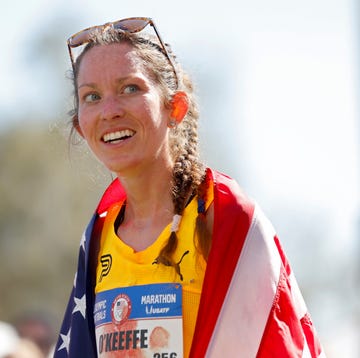Alberto Salazar, the coach of the Nike Oregon Project, encouraged team members to take prescription medications in the hope of gaining a competitive advantage, according to a report published by ProPublica.
Among the allegations made by former athletes and a former assistant coach: that 2012 Olympic silver medalist Galen Rupp was on testosterone medication as far back as 2002, when he was a high school runner coached by Salazar; that Salazar sometimes dispensed prescription medications when a physician indicated otherwise; and that physicians were enlisted to help athletes take prescription medications they didn't have a medical need for.
In the report, Salazar and Rupp denied knowingly violating anti-doping rules. Rupp has never failed a drug test.
The report was written by David Epstein, author of The Sports Gene, and produced in collaboration with the BBC, which will air a one-hour documentary on the topic Wednesday night.
Among the former Nike Oregon Project members interviewed for the report were Kara Goucher, who left the team in 2011, and Steve Magness, who was an assistant coach and scientific advisor before leaving in 2012. (Magness writes a column for Running Times, which along with Runner's World is published by Rodale.)
When contacted by Newswire on Wednesday, Magness refused comment. Through a representative, Goucher also declined to speak but issued this statement: “The Gouchers have been completely honest and transparent about their experiences, and we ask you to please refer to ProPublica and the BBC for information. Please respect the Gouchers and their family’s privacy at this time.”
No former team members alleged use of the blood booster EPO, and none implicated double Olympic gold medalist Mo Farah, Sara Hall Smashes American Masters Marathon Record performance-enhancing drugs.
In a written statement to the media, Salazar said, "I believe in a clean sport and hard work, and so do my athletes. Apparently that is not interesting enough for some. I am very disappointed that the BBC and ProPublica and their 'reporters' have allowed themselves to be used by individuals with agendas and have engaged in such inaccurate and unfounded journalism. Rather than present the facts, they opted for sensationalism and innuendo. It is particularly sad that they have attacked Galen and his excellent reputation, which he has earned through years of hard work."
Rupp also released a statement, which said in part, "I expressly told these reporters that these allegations were not true and their sources admit they have no evidence, yet they print 'suspicions' attacking me and sullying my reputation."
Shannon Rowbury, Major Changes Hit Northern Arizona Elite Newswire, "I was not on the team while Steve Magness or the Gouchers were part of the Nike Oregon Project, so I cannot comment on what I wasn't here for. I can say, however, that I have never seen anything that would make me question Alberto or anyone in the group. As for myself personally, I value my honor and integrity too much to ever cheat."
Salazar has long had a reputation for using Nike’s extensive resources and cutting-edge technology to help athletes perform better. Many in the sport, however, believe that the use of therapeutic use exemptions (TUEs) for medications that athletes take may be ethically questionable. TUEs are granted by the United States Anti-Doping Agency to athletes who have an illness or condition that requires taking medications that are prohibited by the World Anti-Doping Agency. Some experts and observers speculate that a few athletes, coaches, and physicians abuse these exemptions by lying about medical conditions in order to be able to legally use medications that may enhance their performance.
“Kara detailed an instance in which Rupp was being coached on which symptoms he needed to have in order to get a TUE,” Epstein said in a Newswire interview on Wednesday.
The investigation uncovered “compelling evidence of unethical use of medications,” Epstein said.
For example, his report includes an incident in which 2007 World Championships bronze medalist Goucher was advised by Salazar to take Cytomel, a form of synthetic thyroid hormone prescribed for an underactive thyroid, to help her lose weight after giving birth in 2010. Goucher said in the article that she did not take the drug and that Salazar gave her a bottle of pills with the prescription label torn off of it.
“Her doctor told her not to take it,” Epstein said. “Whatever you think of athletes taking thyroid medication, it’s still illegal to take somebody else’s prescription.”
In another incident detailed in the report, Magness was given a document detailing Rupp’s blood tests. A notation on the document dated when Rupp was still in high school said, “presently on prednisone and testosterone medication.”
Testosterone medications are banned, except in cases of medical need. Epstein said Salazar and Rupp responded via email that Rupp has never taken testosterone or testosterone medication. Prednisone, a medication used for asthma, requires an athlete to get a therapeutic exemption for use because it can block pain and potentially enhance oxygen consumption, according to Epstein’s article.
“Magness said he was unnerved when he saw that test,” Epstein said. “Alberto told him that the testosterone was a mistaken notation. Alberto said [in an email to ProPublica] that Galen was taking a supplement called Testoboost at the time, to offset the effects of the prednisone.”
Rupp holds the American record for 10,000 meters (26:44.36), set in 2014. He also owns indoor American records for 3000 meters (7:30.16), 2 miles (8:07.41), and 5000 meters (13:01.26).
Among the other allegations included in the report was a separate incident when Rupp was unable to procure a TUE for prednisone. Magness said Rupp took the medication anyway before flying to Germany to race a 5K. Magness flew to Minnesota with a bottle of Rupp’s urine to be tested at the Mayo Clinic. Magness then flew to Germany to meet Rupp, who said he wasn’t feeling well. According to the report, the box arrived at the hotel from Salazar—inside was a paperback book with a section of the pages hollowed out and two pills taped inside.
Other Hearst Subscriptions.
“We gave Alberto and Galen the chance to respond to everything,” Epstein said. “They didn’t respond to that, but some people might conclude that it was not normal behavior.”
Epstein has covered performance-enhancing drug abuse in other sports, but said in no others has he seen the kind of concern currently being expressed by professional track and field athletes.
“I’ve never experienced the level of anger from athletes themselves—in track, it’s the athletes who have the loudest voices in asking for more strict policies from anti-doping agencies,” he said. “The Oregon Project is a team of some of the best runners in the world and we’re at a boiling point.”
While the investigation revealed what some consider questionable behavior, it remains to be seen whether rules were broken. Training at altitude is also a performance enhancer, as well as drinking a well-timed cup of coffee—both are perfectly legal. Where is the line drawn in a large gray area? And should fans care at this point?
“I think about that a lot,” Epstein said. “I come back to the philosopher Bernard Suits’ quote, ‘Playing a game is a voluntary attempt to overcome unnecessary obstacles.’ What is sport, then, if you can eliminate the obstacles?”
Races - Places.
Foot Locker XC Results.













